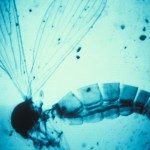Lien vers Pubmed [PMID] – 23684730
Dev. Comp. Immunol. 2014 Jan;42(1):85-92
RNA interference (RNAi) controls gene expression in eukaryotic cells and thus, cellular homeostasis. In addition, in plants, nematodes and arthropods it is a central antiviral effector mechanism. Antiviral RNAi has been well described as a cell autonomous response, which is triggered by double-stranded RNA (dsRNA) molecules. This dsRNA is the precursor for the silencing of viral RNA in a sequence-specific manner. In plants, systemic antiviral immunity has been demonstrated, however much less is known in animals. Recently, some evidence for a systemic antiviral response in arthropods has come to light. Cell autonomous RNAi may not be sufficient to reach an efficient antiviral response, and the organism might rely on the spread and uptake of an RNAi signal of unknown origin. In this review, we offer a perspective on how RNAi-mediated antiviral immunity could confer systemic protection in insects and we propose directions for future research to understand the mechanism of RNAi-immune signal sorting, spreading and amplification.

